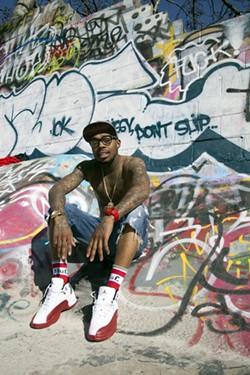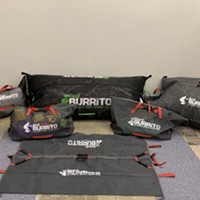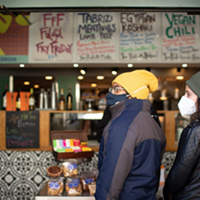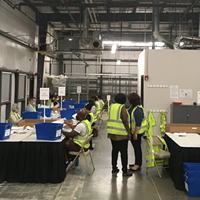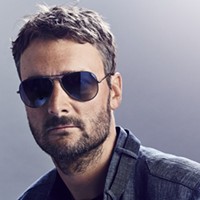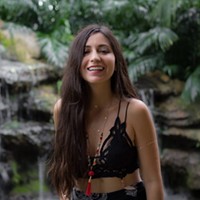Deniro Farrar's making moves
The Charlotte rapper's meteoric rise in the mixtape world is anything but typical
By Mike McCrayFinishing off a two-liter of Hawaiian Punch, 23-year-old Charlotte rapper Deniro Farrar places the empty bottle down amidst the debris of a typical late night — fast-food cups, coffee stains and cigarette butts. He finds a seat in the small basement studio as his manager, Konstantin Kazmierski, sits at the computer console and scrolls through promotional flyers for a handful announcing Farrar's 12 upcoming South By Southwest Music Conference performances this week in Austin, Texas. Farrar can't hide his excitement.
Although the rapper has opened shows for countless big names — from Nas and Damian Marley to Young Jeezy and Big K.R.I.T. — SXSW is Farrar's chance to finally meet a lot of the people he's collaborated with during the past year, including rapper Shady Blaze of Oakland, Calif., and Canadian producer Ryan Hemsworth, who worked on four songs for Farrar's latest mixtape, Destiny. altered.
As Kazmierski plays various beats and asks if I've ever heard of the producers, Farrar nods his head to almost every track that flows from the speakers. He raps along to the ones for which he's already written lyrics. There's plenty of beats to choose from. Ambitious producers have sent Kazmierski and Farrar inspiration from all over the world. The beats are organized with "aaa" or "1" at the beginning, so Farrar and Kazmierski don't have to scroll far to find the ones they love.
In the Internet era, artists can make a name for themselves outside the towns they live in while maintaining relative anonymity at home. Farrar built a big fan base online and performs more frequently outside of Charlotte than he does at local venues. Whenever someone tweets about him, Farrar finds out where the tweeter is from. People who play his music on underground mix shows as far away as London and New Zealand have contacted the rapper about performing.
Farrar, who bounced among West Charlotte, Waddell and Garinger high schools while growing up, now focuses his education on studying the music industry on the fly. By keeping tabs on local artists as well as trying to expand his scope, he's learned a lot.
Farrar started rapping seriously while making his 2010 debut mixtape, Feel This. He began writing and crafting lyrics instead of just freestyling. "I had never written structured rap songs until Feel This," Farrar says. "With Destiny. altered, I found my lane. I found my niche. I found me as a rapper. I found where I want to be, where I want to go, the people I want to cater to, and I ran with that shit."
The music got more personal and Farrar's motive changed from rapping to make money to rapping to make history. He also benefited from getting quality stage time opening big-name shows around Charlotte over the past year. Early on, he was paired with more established artists on the locally owned label he records for, Black Flag Records — artists such as A. Moss and Define Jones (formerly Dow Jones).
Whenever Farrar felt he hadn't earned his space on the stage, Black Flag owner David Luddy would offer this advice: "You deserve to be on that stage, just like anyone else and don't let anybody tell you no different. When you get out there, you own that bitch. When you leave, you want people asking, 'Who was that dude?'"
That approach worked, but Farrar admits that he began to get arrogant, going off on Twitter rants and talking trash to anyone reading. "Listen up you fuckers, that's not rain that's me pissing from my private jet in the sky," he wrote last May. He's matured in the past 10 months.
"It ain't even what I've figured out, I just found my niche with the music and the beats," Farrar says. "It's what [Kazmierski] has been able to do. The moves he's has been able to make. The people he's been able to get in contact with. The collabs I've been able to get. The producers who've reached out to me. That's key."
Watching the Black Flag indie camp grow has been interesting. Not long ago, the artists' beats and videos sounded and looked different. That was before any of them could afford better equipment; it before they knew what they were doing. The artists helped to build the label from the ground up and they learned as they went — at a rapid pace.
"Everything is different in a short time, meaning months," Farrar says of his and the label's whirlwind. "It didn't even take three, four or five mixtapes to do it. One mixtape project, then [Destiny. altered]. After that, ain't no telling what the fuck is going to come out."
Farrar says his sound is closer to the harder-edged hip-hop of the '90s than today's more pop-based sounds. "It's beats, the content, the lyrics," he says. "It's the same shit that I grew up on. It's that 2Pac, that Scarface, that real, in-the-ghetto [music]. This ain't that bubblegum, Soulja Boy, I-do-the-Superman, nowaday hip-hop music."
[-page]Speaking of...
Latest in Music Features
More by Mike McCray
-
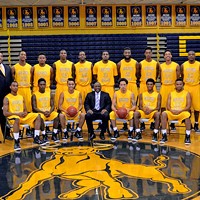
CIAA 2015: Our picks for this year's basketball teams
Feb 25, 2015 -
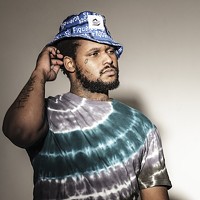
Schoolboy Q: street scholar
Apr 17, 2014 -

CIAA 2014: The basketball
Feb 26, 2014 - More »
Calendar
-
The 502s - Great American Road Trip with Special Guest Daniel Nunnelee @ N.C. Music Factory
-

Hands On Cocktail Class Featuring Gin at DTR Southpark @ DTR SouthPark
-
 Giant Rooks @ The Underground
Giant Rooks @ The Underground -

Aria Tuscan Grill Featuring Allegrini - Charlotte Wine + Food Week @ Aria Tuscan Grill
-

Angeline’s Featuring Sciandri Family Vineyards @ Angeline's
-
The night Dickey Betts broke my guitar 7
All the while, Gregg Allman sat face down in mashed potatoes
-
Angela Saylor Brings Her Electronic Music Project 'Minthill' Back Home
The Art of Memory
-
Live review: Circa Survive, Amos' Southend (12/12/2014)
Band thrills packed Charlotte venue with hard-rocking set.

